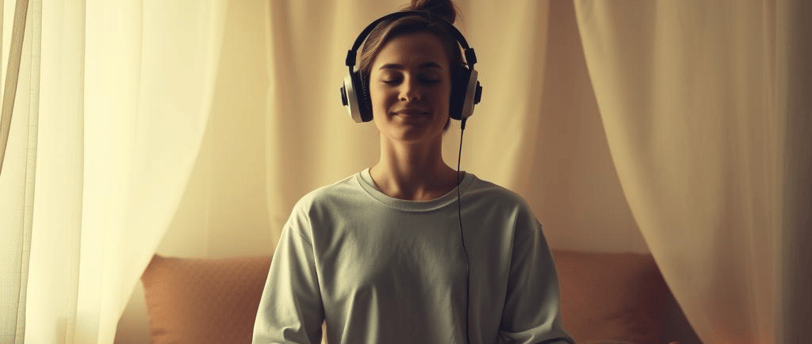Try Guided Meditation for Anxiety: Apps like Calm or Headspace Can Help Ease Stress
🧘WELLNESS TIPS😌 STRESS MANAGEMENT & EMOTIONAL BALANCE


In an age defined by relentless hustle, digital distractions, and an ever-increasing pace of life, anxiety has become a ubiquitous companion for many. Whether it's the pressures of work, personal relationships, or the weight of global events, managing anxiety is more critical than ever. Fortunately, modern technology has stepped in to provide solutions that were not accessible to previous generations. Among these solutions, guided meditation apps like Calm and Headspace have emerged as essential tools for those seeking relief from anxiety.
Understanding Anxiety
Anxiety is a complex and multifaceted phenomenon affecting millions worldwide. It's not only a feeling of unease but can manifest in various physical symptoms, including panic attacks, sleep disturbances, and gastrointestinal issues. The intensity of anxiety can fluctuate based on numerous factors—personal circumstances, environmental stressors, and even genetic predispositions.
While traditional treatment methods like therapy and medication are effective for many, self-guided practices like meditation have shown promise as complementary strategies. Research suggests that mindfulness and meditation can help reduce anxiety levels, providing individuals with tools to manage their thoughts and emotions more effectively.
The Science Behind Guided Meditation
Guided meditation involves listening to a facilitator—either through an app or a live session—while being guided through a series of techniques aimed at promoting relaxation, awareness, and emotional easing. Studies have shown that even brief periods of meditation can yield significant benefits for mental health.
Reduces Stress: Mindfulness meditation focuses on the present moment, helping to lessen rumination about past events or worries about the future. Scientific studies have demonstrated that regular meditation can lower levels of cortisol, the hormone associated with stress.
Increases Self-Awareness: Guided meditation encourages individuals to observe their thoughts without judgment, fostering an environment where they can become more self-aware and understand their emotional triggers.
Enhances Well-being: Many people report feeling a greater sense of well-being and emotional balance after incorporating meditation into their routine. This emotional resilience can help combat the cyclical nature of anxiety.
The Role of Apps in Meditation
The advent of meditation apps has transformed how people approach mental health. With just a smartphone, users can access a vast library of guided meditations tailored to different needs—be it anxiety relief, insomnia, or even performance enhancement. Here, we will take a closer look at two of the most popular apps: Calm and Headspace.
Calm
Calm is arguably one of the leading meditation apps in the market, known for its soothing design and diverse content. Here's what makes Calm stand out:
Wide Range of Content: Calm offers a mixture of guided meditations, sleep stories, music tracks, and even specialized programs around topics such as self-improvement and gratitude. Users can select meditations according to their mood or specific situations.
User-Friendly Interface: With an intuitive design, Calm allows users to easily browse through categories, making it convenient even for those new to meditation.
Daily Calm: For those looking for a short mindfulness routine, Calm features a "Daily Calm" session that lasts about 10 minutes, making meditation accessible regardless of how busy an individual's day may be.
Sleep Stories: Calm's innovative sleep stories are narrated by soothing voices, creating a relaxing atmosphere conducive to falling asleep—an essential feature for those whose anxiety disrupts their sleep.
Headspace
Headspace brings a playful vibe to the world of meditation while maintaining its effectiveness. Here are some distinguishing features:
Themed Courses: Headspace organizes its content into thematic courses that provide structured learning. For example, users can choose courses specifically designed to address anxiety, focus, or productivity.
Animation and Visuals: One of Headspace's unique selling points is its use of animation to explain meditation concepts. This visual aid can be particularly helpful for beginners who might feel overwhelmed by abstract ideas.
Quick Sessions: Headspace offers short meditations that last five to ten minutes, making it easy to squeeze a mindful moment into a hectic schedule—ideal for those experiencing day-to-day anxiety.
Buddy System: Headspace incorporates a social aspect with its "Buddy" feature, allowing users to connect and meditate together. This can enhance accountability and provide support for those navigating anxiety.
Integrating Guided Meditation into Your Routine
While meditation apps offer fantastic resources, it's essential to integrate them effectively into your daily life. Here are some practical tips to help you get started:
Set Time Goals: Whether it's five minutes or half an hour, set a consistent timeframe for your meditation practice to build a sustainable routine. Try picking a time that feels naturally aligned with your schedule—morning, lunch break, or before bed.
Create a Peaceful Environment: Designate a quiet space in your home that fosters relaxation. A tranquil corner with dim lighting and minimal distractions can significantly enhance your meditation experience.
Be Patient: Just like any new skill, meditation takes time to master. Some days may be more challenging than others. Be patient with yourself; consistency matters more than perfection.
Experiment with Different Styles: Both Calm and Headspace offer a variety of meditation styles and durations. Feel free to explore and find the ones that resonate with you.
Incorporate Mindfulness into Daily Activities: Beyond dedicated sessions, practice mindfulness during everyday activities—be it eating, walking, or even washing dishes. This will create a richer and more consistent experience of mindfulness in your life.
Conclusion
Anxiety is a shared human experience, but that doesn’t mean we have to suffer in silence. Guided meditation through apps like Calm and Headspace provides a valuable resource in managing anxiety. By embracing mindfulness and meditation, you can cultivate a greater sense of self-awareness, emotional balance, and resilience against life’s stresses. So, take that first step: download a meditation app, carve out a few moments of your day, and let guided meditation lead you towards a more tranquil mind.
